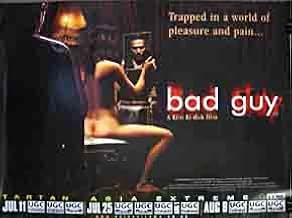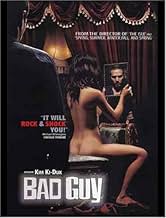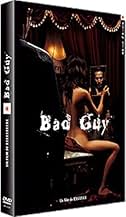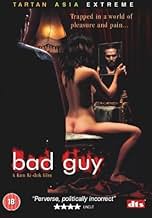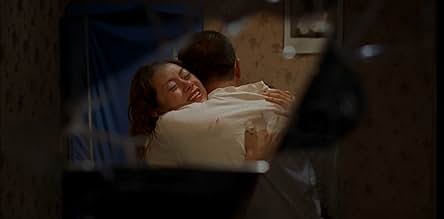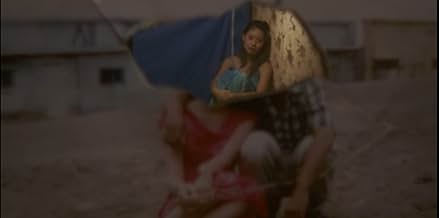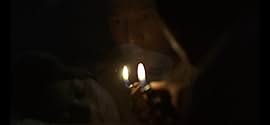IMDb-BEWERTUNG
6,6/10
11.010
IHRE BEWERTUNG
Ein gefühlloser Gangster versucht, das Leben eines jungen Mädchens zu ruinieren, das ihn zurückgewiesen hat. Er zwingt sie zur Prostitution und spioniert sie regelmäßig aus, dann beginnt er ... Alles lesenEin gefühlloser Gangster versucht, das Leben eines jungen Mädchens zu ruinieren, das ihn zurückgewiesen hat. Er zwingt sie zur Prostitution und spioniert sie regelmäßig aus, dann beginnt er sich bald in sie zu verlieben.Ein gefühlloser Gangster versucht, das Leben eines jungen Mädchens zu ruinieren, das ihn zurückgewiesen hat. Er zwingt sie zur Prostitution und spioniert sie regelmäßig aus, dann beginnt er sich bald in sie zu verlieben.
- Auszeichnungen
- 4 Gewinne & 3 Nominierungen insgesamt
Kim Yun-tae
- Yun-tae
- (as Yun-tae Kim)
Kim Jeong-yeong
- Eun-hye
- (as Kim Jung-young)
Namgoong Min
- Hyun-soo
- (as Namkoong Min)
Empfohlene Bewertungen
"Bad Guy (Nabbeun namja)" is an earlier film of Ki-duk Kim that is probably being released now in the U.S. due to the success of "Spring, Summer, Fall, Winter... and Spring (Bom yeoreum gaeul gyeoul geurigo bom)," but fans of that visually entrancing parable should be warned how very different this exploration of the depths of human nature is.
The style has some similarity in that there is no exposition and we have to connect images that tell a tale of two very different people over time. Context is everything as voyeurism keeps repeating along a sexual spectrum of men and women together -- to romantic or erotic or degrading or lustful or violent, full of obsession or love or hate or longing or disgust, whether in prostitution, a relationship, or rape.
A key context is emotions and degrees, whether by the man or woman, or mutual, or drained of feeling such that I'm not sure love has any meaning in this film. There's a recurring use of Egon Schiele's erotic art to make some kind of comparative point about a continuum of sexual images and their effect on the viewer.
The titular character is reminiscent of Quasimodo of "The Hunchback of Notre Dame" fixating on Esmeralda if he were a psychopathic pimp in, I presume, Seoul's lurid red light district and played by the charismatic Jae-hyeon Jo, like an apolitical "Romper Stomper." I did get a little lost where he fit into the hierarchy of the yakuza-like gangster organization that controls the district, how much authority he has, and who was on top of whom to interpret their obsessions. Some of the encounters we see are presumably his limited fantasies as he miraculously recovers from various violently noble efforts to protect and reach out to the object of his affection that reminded me of the ambiguous ending of Jane Campion's "The Piano."
The film explores some of the same territory as the work of Catherine Breillat, but the context seems uneasily different when I'm the only woman in the theater and the director is male, perhaps because the central woman is always an object, even as she pitifully adapts to her various degradations, and even resists being freed from them. All the women in the film treat each other like the men treat them.
The style has some similarity in that there is no exposition and we have to connect images that tell a tale of two very different people over time. Context is everything as voyeurism keeps repeating along a sexual spectrum of men and women together -- to romantic or erotic or degrading or lustful or violent, full of obsession or love or hate or longing or disgust, whether in prostitution, a relationship, or rape.
A key context is emotions and degrees, whether by the man or woman, or mutual, or drained of feeling such that I'm not sure love has any meaning in this film. There's a recurring use of Egon Schiele's erotic art to make some kind of comparative point about a continuum of sexual images and their effect on the viewer.
The titular character is reminiscent of Quasimodo of "The Hunchback of Notre Dame" fixating on Esmeralda if he were a psychopathic pimp in, I presume, Seoul's lurid red light district and played by the charismatic Jae-hyeon Jo, like an apolitical "Romper Stomper." I did get a little lost where he fit into the hierarchy of the yakuza-like gangster organization that controls the district, how much authority he has, and who was on top of whom to interpret their obsessions. Some of the encounters we see are presumably his limited fantasies as he miraculously recovers from various violently noble efforts to protect and reach out to the object of his affection that reminded me of the ambiguous ending of Jane Campion's "The Piano."
The film explores some of the same territory as the work of Catherine Breillat, but the context seems uneasily different when I'm the only woman in the theater and the director is male, perhaps because the central woman is always an object, even as she pitifully adapts to her various degradations, and even resists being freed from them. All the women in the film treat each other like the men treat them.
Beauty and the Beast was an original tale written by a French author in 1756 and is considered the gold standard for "unusual" love stories.
(The best movie version of the original story was also done by a French film-maker and reviewed here by this writer -- La Belle et La Bete) I am guessing that if you go back far enough you will find many versions of equally twisted love stories through history, because love at its core is not always the stuff of Valentine cards.
This extraordinary film is about love, it is also about justice, it is also about impulse control.
It also gives a whole meaning to the term "unrequited love." I recommend it but suggest you leave your expectations at the door. Even the publicists for the film seem to have got it wrong -- the artwork for the DVD suggest a seamy sex movie and in fact that approach is completely wrong.
Amazing.
(The best movie version of the original story was also done by a French film-maker and reviewed here by this writer -- La Belle et La Bete) I am guessing that if you go back far enough you will find many versions of equally twisted love stories through history, because love at its core is not always the stuff of Valentine cards.
This extraordinary film is about love, it is also about justice, it is also about impulse control.
It also gives a whole meaning to the term "unrequited love." I recommend it but suggest you leave your expectations at the door. Even the publicists for the film seem to have got it wrong -- the artwork for the DVD suggest a seamy sex movie and in fact that approach is completely wrong.
Amazing.
Kim Ki-duk's seventh movie could have been so much more. Romantising forced prostitution is not a very sensible decision. Lets face it the film is meant to be uncomfortable viewing, but by the end it was to much, and the final message put forth seemed a grave mistake - if you force sex on a girl enough she will eventually love you and stay with you forever even if she is still forced to sell herself (now thats shocking)!! As for the film making, in general it was disappointing, a horrible shaky POV shot to show a character's drunkenness - that is lazy film-making, and the use of bad music, added to the blatant romanticism of a serious issue. Some valid attempts made at portraying the nasty realism of the red light district were again undercut by cheesy romance! Although there is no doubt that Kim Ki-duk is a talented filmmaker (see 'Spring, Summer' for a fine example), this film showcases little of this.
In Seoul, and in every other major South Korean city, there are red light districts. Few local folks will admit to their existence. But Kim Ki Duk does. And he does even more. He shows us how they work, how innocent young women get trapped by the "business," how a sense of helplessness descends upon the prostitutes, and how painfully unwelcome and irrelevant their boyfriends, their husbands, their families, become.
To make a film with these themes central may not seem like a winning decision. However, this is award-winning director Kim's territory, and he does with the subject matter what he will. No, it's not pretty, so don't expect it to be. No, it doesn't end up with everything working out happily, because life rarely does, so don't expect that either. No, there is no fine, pat conclusion, because Kim knows better.
I noticed that this film contains bits of celluloid that was picked up off the cutting room floor after Kim's renowned "3-Iron" was made. Expect some unexpected scenes in this regard. Unfortunately, the film is ugly from the beginning, with an innocent young woman (the magnificent actress and Kim favorite Seo Won), taken into prostitution against her will through unlikely circumstance. She is not a willing prostitute and she rebels throughout the plot, much to her dismay. But Kim is so adept at this. Ugliness becomes beautiful, noise turns to stillness, the guilty transform to innocence and the truly innocent remain so. I gasp at such awesome presentation. From Kim, we expect this. Still, he can overdo it. Why, I ask, does Kim always place a woman in mortal peril? Is this a must for his stories, his fables? If so, what is he trying to teach us? Certainly, I hope, more than the fact that "sexploitation" exists in his home country.
"Bad Guy" is a beautiful movie, but I only grant it 7 of 10 because Kim has apparently become obsessed with sexual violence (reference "The Isle," "Coast Guard" and "Address Unknown"). Also, there is just too much emphasis placed on predictable fight scenes. Sure, such scenes can serve a purpose, but by 2002, Kim should know he doesn't need to resort to the horrific presentations he makes them. I appreciate what he is trying to accomplish: a counterpoint to his truly beautiful scenes. But do we really need to be hit over the head with sexual brutality again and again? Perhaps his own culture does and, like what Mean Streets and Taxi Driver offered America in the 70's, Kim is trying to do something similar for South Korean society in the 2000 oughts. We can but hope.
Kim takes risks in showing the world the dark underbelly of contemporary Korean culture. He is to be commended for that. But he is capable of presenting so much more, and that is precisely what this film lacks. Kim needs to stop using shock as his stock in trade, and return to his more sublime talents, such as presenting unlikely heroes and heroines. Most of his viewers are, I am sure, quite over blatant scenes of sex and violence. "We get it, Mr. Kim, thank you, offer us something more. We know you can. Make those scenes MEAN something. That is what made you attractive in the first place; do not forget it."
Quickly, as an aside, if anyone supposes, simply because of the similarity of titles, that "Bad Guy" is similar to "Old Boy" by Park Chan Wook, forget it. These two films are nothing alike, except that they are both good.
This film is just good (not great) and should be received by Kim Ki Duk fans with mixed reactions.
To make a film with these themes central may not seem like a winning decision. However, this is award-winning director Kim's territory, and he does with the subject matter what he will. No, it's not pretty, so don't expect it to be. No, it doesn't end up with everything working out happily, because life rarely does, so don't expect that either. No, there is no fine, pat conclusion, because Kim knows better.
I noticed that this film contains bits of celluloid that was picked up off the cutting room floor after Kim's renowned "3-Iron" was made. Expect some unexpected scenes in this regard. Unfortunately, the film is ugly from the beginning, with an innocent young woman (the magnificent actress and Kim favorite Seo Won), taken into prostitution against her will through unlikely circumstance. She is not a willing prostitute and she rebels throughout the plot, much to her dismay. But Kim is so adept at this. Ugliness becomes beautiful, noise turns to stillness, the guilty transform to innocence and the truly innocent remain so. I gasp at such awesome presentation. From Kim, we expect this. Still, he can overdo it. Why, I ask, does Kim always place a woman in mortal peril? Is this a must for his stories, his fables? If so, what is he trying to teach us? Certainly, I hope, more than the fact that "sexploitation" exists in his home country.
"Bad Guy" is a beautiful movie, but I only grant it 7 of 10 because Kim has apparently become obsessed with sexual violence (reference "The Isle," "Coast Guard" and "Address Unknown"). Also, there is just too much emphasis placed on predictable fight scenes. Sure, such scenes can serve a purpose, but by 2002, Kim should know he doesn't need to resort to the horrific presentations he makes them. I appreciate what he is trying to accomplish: a counterpoint to his truly beautiful scenes. But do we really need to be hit over the head with sexual brutality again and again? Perhaps his own culture does and, like what Mean Streets and Taxi Driver offered America in the 70's, Kim is trying to do something similar for South Korean society in the 2000 oughts. We can but hope.
Kim takes risks in showing the world the dark underbelly of contemporary Korean culture. He is to be commended for that. But he is capable of presenting so much more, and that is precisely what this film lacks. Kim needs to stop using shock as his stock in trade, and return to his more sublime talents, such as presenting unlikely heroes and heroines. Most of his viewers are, I am sure, quite over blatant scenes of sex and violence. "We get it, Mr. Kim, thank you, offer us something more. We know you can. Make those scenes MEAN something. That is what made you attractive in the first place; do not forget it."
Quickly, as an aside, if anyone supposes, simply because of the similarity of titles, that "Bad Guy" is similar to "Old Boy" by Park Chan Wook, forget it. These two films are nothing alike, except that they are both good.
This film is just good (not great) and should be received by Kim Ki Duk fans with mixed reactions.
This is not the best of movies, but I rank it high because it did it for me. Though the characters are not really presented to the viewer, they are developed through the movie by showing their actions. The plot is not really important here, and people that cling to whatever feminist or political agendas when discussing a movie are wasting everybody's time. It reminds me of an old Italian movie, I can't remember the name or actors because I've seen it when I was a kid, with a mafia boss that falls in love with a woman, kidnaps her but wants to charms her, rather that rape her. This is also about a generally violent man who's attention is captured by a beautiful girl and he also wants access to her soul, rather than her body.
The movie is full of contrasts and paradoxes, but what sets it apart is the atmosphere (I had my heart pumping a good part of the movie, without it being an action movie or anything) and the subtle way it reveals the deep needs of every character.
Its bad part, though, is that close to the end you keep expecting the movie to end and it doesn't. The slow pace of the movie doesn't help either, so a feeling of "is it over yet?" can easily set in.
I liked it, I recommend it to people who have the mood to see a psychological Asian movie about gangsters, prostitutes and the power of love.
The movie is full of contrasts and paradoxes, but what sets it apart is the atmosphere (I had my heart pumping a good part of the movie, without it being an action movie or anything) and the subtle way it reveals the deep needs of every character.
Its bad part, though, is that close to the end you keep expecting the movie to end and it doesn't. The slow pace of the movie doesn't help either, so a feeling of "is it over yet?" can easily set in.
I liked it, I recommend it to people who have the mood to see a psychological Asian movie about gangsters, prostitutes and the power of love.
Wusstest du schon
- WissenswertesDirector Trademark (Kim Ki-duk): Han-ki remains a mute character for much of the film.
- Crazy CreditsThe last shot shows a truck with an orange cover going down a road in the distance. When the end credits begin, the truck becomes a small orange square that remains on the screen for the entire duration of the end credits.
- VerbindungenReferenced in Arirang - Bekenntnisse eines Filmemachers (2011)
- SoundtracksI tuoi fiori
Written and Performed by Etta Scollo
Top-Auswahl
Melde dich zum Bewerten an und greife auf die Watchlist für personalisierte Empfehlungen zu.
- How long is Bad Guy?Powered by Alexa
Details
- Erscheinungsdatum
- Herkunftsland
- Offizieller Standort
- Sprache
- Auch bekannt als
- Mal chico
- Drehorte
- Produktionsfirmen
- Weitere beteiligte Unternehmen bei IMDbPro anzeigen
Box Office
- Weltweiter Bruttoertrag
- 62.100 $
- Laufzeit
- 1 Std. 40 Min.(100 min)
- Farbe
- Sound-Mix
- Seitenverhältnis
- 1.85 : 1
Zu dieser Seite beitragen
Bearbeitung vorschlagen oder fehlenden Inhalt hinzufügen


